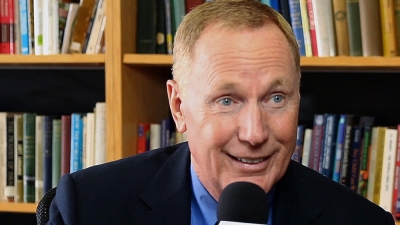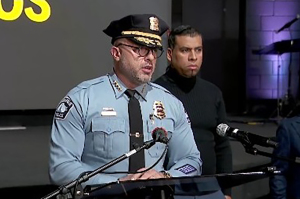Interview: Max Lucado in 'You'll Get Through This' Book on God and Overcoming Suffering
NEW YORK – Max Lucado, bestselling author and preaching minister at Oak Hills Church in San Antonio, Texas, has said that ultimately even the greatest human tragedies will be used by God in his new book You'll Get Through This.
Lucado's books have been featured on every major national bestseller list, and he was named one of the most influential leaders in social media by The New York Times. He served with his wife as a missionary in Brazil before beginning his career as a minister at Oak Hills Church in 1988. His 30th trade book, You'll Get Through This, released in September, examines how people can turn to God in times of intense personal suffering and conflicts.

Below is an edited transcript of Lucado's interview with The Christian Post on Tuesday regarding You'll Get Through This.
CP: Why release a book about coping with human suffering now?
Lucado: I think it's always a good time to release a book about human suffering. If we're not facing a challenge, we've just come out of a challenge, or we're about to go into one. But that said, this is a unique time. It seems like we've just come out of one societal concern, and then we head into another. If it's not the economy, it's the concern about another war, it's concern about another international conflict. It seems like, whether it's true or not, we just seem to have more worldwide troubles.
I think because of the media, we're aware of what's happening around us more than any other generation, and consequently people have to deal with fears that perhaps they would have been protected from years ago. There's this fear – "will I get through this, am I going to meet the catastrophe of our generation?" so I think it is a good time for us to be talking about God's ability to get us through all the tough times in our lives.
CP: What does the story of Jesus Christ offer people who are struggling with suffering that no other story or religion can?
Lucado: No other story or religion dares to suggest that God became flesh and walked among us, in the sense that he felt suffering himself. No other religion or philosophy suggests a God who cares so personally and deeply that He would cry out like Jesus did in the Garden of Gethsemane: "This is not what I want. Can you take it away from me?" Well that's a prayer for somebody who's trying to get through a tough time. And so we have a God presented in the Bible who understands us, who went through what we're going through, and when we say "I can't get through this," he understands that, and he can give personal and immediate help.
CP: Is human suffering the hardest subject to write on?
Lucado: If it's not, I don't know what is. I do know that struggles over human suffering cause more crises of faith than anything else. When things do not turn out as we had hoped, that creates a crisis of whether we believe in God or not, or at least whether we believe in God's ability or God's concern. So it may be the hardest topic. There might be more complex topics, in terms of understanding prophecy or disentangling a certain doctrine, or rightly teaching how a book was written, but as far as something that goes deep in a person's heart, I think that's a good observation, that the topic of human suffering might be the most difficult.
CP: What makes some people lose their faith in times of personal tragedies, for example losing a child, while others turn to church for comfort?
Lucado: It all has to do with the problem of unmet expectations. We all have expectations of God, whether we acknowledge it or not, or know it or not. 'If God is God, then 9/11 will never happen. If God is God, then I will never have to bury my children. If God is God, then I'll lead a good life, I will always have a job.' We don't say it like that, but deep within us we all have these expectations of God.
And so when we pass through a tough time, we are disappointed in Him. We feel like He has let us down. So we have to work that through. And I think that the working through is a real important part of the process. That includes some honest prayer, that includes visiting with people who have gone through similar things, that includes turning to God's word and letting God's word trump our own emotions. There are some real practical things that we can do to help us get through that. But I think it's difficult, and sometimes it takes a while. But God always gets us through it.
CP: In the last chapter you offer the sequence evil – God – good, and you provide countless of examples throughout the book of how God always triumphs over evil. But when confronted with something as extreme as the recent Syrian chemical weapon attack where over 400 children were killed - is it wise or right for a Christian to wonder "Well how or why can something like that be used for good?"
Lucado: It's right for us to wonder, and like we've said already, it's the hardest of the questions. Not just the 400 children, but the 150,000 people who have died in the conflict in two and a half years. Any time there's that type of atrocity, any time there's that type of difficulty, we struggle with: "What in the world is happening? Would a good God let this happen?" And that takes us all the way back to the question: "Why is there evil? How did it get here, what purpose does it serve?" In the book, I try to advance the idea that evil happens because free choice is here.
Free will happens. And the consequences of free will are poor choices. And those poor choices lead to disastrous behavior. And the only way there would be no disastrous behavior on the planet would be if God were to somehow remove our free will. Something He does not want to do.
But the message of Joseph, which does involve a worldwide crisis, teaches us that God can use something like a famine to actually advance His cause and thwart the devil's activities. So that's really where our hope is. There's never a promise that there won't be disasters and calamities on a worldwide scale, but there is a promise that even the most difficult ones will ultimately be used by God.
CP: In a previous chapter you talk about one of the most fundamental promises in the Bible - that there is a heaven, and there will be no suffering there. What is your advice to believers who are struggling to hold on to that promise?
Lucado: Every story in the Bible we should say "Why would God include this story?" Like the story of Joseph, or the story of Job, or the story of Daniel, or the story of Abraham, or the story of Mary. Why did these stories get included in the Bible?
Just about every one of those stories is in the Bible because it is there to help us when we're doubting ourselves. Why is the story of doubting Thomas in the Bible? Well, to teach us that Jesus doesn't kick someone out if they have doubts. Why is the story of Peter in the Bible? Well, to teach us that Jesus does not kick someone out if they deny Him. Why is the story of Joseph in the Bible? Well, I think one reason is to help us learn that there will come a time when we can say good-bye to our good-byes. We do pass through a time of difficulty when we bury somebody. And I sure don't want to make it sound like its easy – but I don't want to take the hope away either. Because this hope is what we hold on to.
So to somebody who is passing through that, finding it terribly difficult to say good-bye to someone - talk to God. Let Him know how hard it is. Come clean with your hurt. It's ok. And trust that little by little, tomorrow will come, tomorrow will be easier than today, and in time, there will be some strength that you didn't know you had.



























